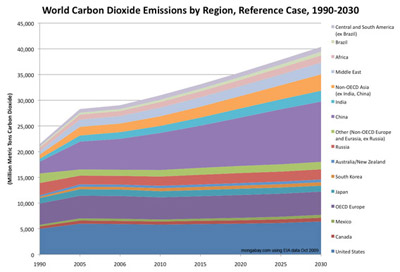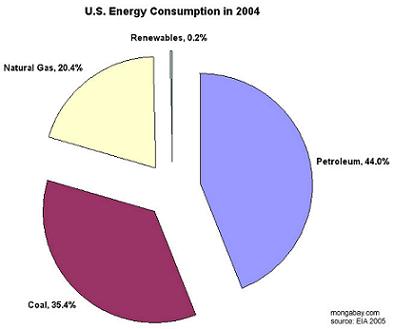Despite a warming planet linked to the burning of fossil fuels, governments around the world still spend 500 billion US dollars a year subsidizing fossil fuel industries. A new study from the Global Subsidies Initiative (GSI) of the International Institute for Sustainable Development looks at the difficult political situation behind ending fossil fuel subsidies.
“Fossil fuels are often the most cost-effective way to provide useful energy, especially in poor households living on already stretched budgets. But the pervasive role of fossil fuels in countries’ economies makes them attractive for politicians to subsidize, which leads to over-consumption,” explains David Victor, author of the study and a professor of political science with UC San Diego’s School of International Relations and Pacific Studies. “Virtually every analysis of fossil-fuel subsidies has shown that most are a complete waste of money, or worse, because money spent on subsidies isn’t available for other purposes that yield much greater social benefits, such as education and rural agriculture.”
Fossil fuel subsidies are highest in Iran, Russia, China, Saudi Arabia, India, and Venezuela. According to Victor, large subsidies are common in oil-producing democracies where fuel prices are big campaign issues. Politicians in such countries often believe that standing up against subsidizing fossils fuels would threaten their political future despite fossil fuels’ environmental impact.
 According to the Energy Information Administration, after China and the United States, among major polluters only India is expected to have significant growth of emissions over the next 20 years. |
For example, Venezuela has the lowest gas prices of any country in the world due to significant subsidization. Prices are almost as low in Iran, which spends 55 billion US dollars a year subsidizing its large consumption of fossil fuels.
“When leaders don’t feel secure in power, as in Iran or Venezuela, they find it particularly difficult to roll back massive subsidy programs,” Victor explains. “As a result, consumers in those countries are not only using more fossil fuels, but also are demanding more subsidies, which are plunging those countries into an economic death spiral.”
India spends 15 billion US dollars on fossil fuel subsidies meant to help the country’s poor afford energy. However, Victor found that the subsidies do more for India’s middle and higher classes than its poor. One exception was poor farmers in India who benefit from the subsidies for power and irrigation. Still, Victor largely sees India’s investment in subsidizing fossil fuels as wasteful.
“When the price of crude oil jumped a few years ago, the Indian government was stuck paying the difference between the regulated price to consumers and the actual price of oil on international markets,” Victor says. “The money that the India government spent on those subsidies was not available for other more beneficial programs to reduce poverty and facilitate economic development.”
Change may be coming, albeit slowly. Last September in Pittsburgh, Pennsylvania top world leaders met at the Group of 20 Summit and agreed to a non-binding resolution to phase out fossil fuel-subsidies over the medium-term. Most environmental groups argue that these ‘perverse subsidies’ are not being phased out quickly enough.
Victor points to China as an example of one nation successfully phasing out fossil fuel subsidies.
“China was in a vulnerable energy-security situation similar to India’s, but the Chinese government took the major political step of reducing subsidies sharply and exposing consumers to market forces,” says Victor. “It makes China more secure by reducing growth in its consumption of fossil fuels and forcing consumers to respond when markets tighten. It also helps China reduce its rate of increase of greenhouse gas emissions and enables it to invest in renewable energy and other sustainable development projects.”
 Renewable energy makes up less than one percent of energy consumption in the United States according to the Energy Information Administration’s Emissions of Greenhouse Gases in the United States 2004. |
In many countries fossil fuel subsidies actually outweigh renewable energy subsidies. Between 2002 and 2008 the United States spent 72 billion dollars on fossil fuel subsidies, but only 29 billion dollars on renewable energy resources—nearly 17 billion dollars of which went to corn-based ethanol, an agricultural fuel that many environmentalists argue is not carbon-neutral and has been linked to deforestation and food crises.
Victor points out that the US should also reconsider its fuel-tax. According to the report, 152 countries have retail gas prices above the US and only 20 countries paid less at the pump, because of the US’s lack of a progressive tax when it comes to fossil fuels.
“The U.S. does not tax fossil fuels to the level needed to offset the costs of burning them,” Victor explains. “The more that consumers in every country in the world pay the full price for fuels—a price that reflects the true costs of fuel combustion on the economy and environment—the easier it will be for market forces to encourage more secure and cleaner energy supplies.”
Yet in a nation where ‘Drill, Baby, Drill’ and ‘Drill Here, Drill Now’ have become mantras against rising fuel prices and some gas station gloat about serving ‘100% gas’, the US may have a difficult time attaching taxes to fossil-fuel consumption, even in face of its environmental impact.
The Green Economy Coalition has estimated that a complete end to fossil fuel subsidies would bring about a reduction of global carbon dioxide emissions by 10 percent.
Related articles
China leaves US (and Europe) in the dust on renewable energy
(02/01/2010) This year China has become the world’s largest manufacturer of solar panels and wind turbines, doubling its wind capacity since 2005. The economically booming nation—and the world’s most populous—has also invested heavily in nuclear power and the world’s most efficient coal plants, according to the New York Times.
US provides 3 billion in subsidies for Exxon-mobil project in Papua New Guinea
(12/10/2009) While officials from around their world are working night-and-day to come up with an international agreement to combat climate change in Copenhagen, the US Export-Import Bank confirmed it will subsidize a natural gas project in Papua New Guinea to the tune of 3 billion dollars—a record for the bank.
Fossil fuel subsidies “bringing us closer to irreversible climate change”
(11/06/2009) The Green Economy Coalition is urging G20 finance ministers to rapidly put an end to fossil fuel subsidies. In a letter to the ministers the coalition argues that these subsidies are contributing directly to climate change and making it difficult for the world to transition to a greener economy.
US subsidies of oil and coal more than double the subsidies of renewable energy
(09/21/2009) During the fiscal years of 2002-2008 the United States handed out subsidies to fossil fuel industries to a tune of 72 billion dollars, while renewable energy subsidies, during the same period, reached 29 billion dollars.
(09/10/2009) The President of France, Nicolas Sarkozy, has announced that he will implement a carbon tax to help “save the human race” from global warming.
US government: $28 carbon price would raise gas prices by 25 cents
(10/08/2008) A national carbon price under a cap-and-trade system would have a limited impact on gasoline prices, reports a new study by the Congressional Budget Office (CBO). The report estimates that a carbon price of $28 per ton — a bit less than current carbon prices in the European market — would boost gas prices by 25 cents per gallon, while a $200 per ton tax would increase prices by less then $2. The findings suggest that the cost of climate change legislation may be lower than claimed by industry, but also indicate that efforts to curb Americans’ driving habitats via a carbon tax or cap-and-trade scheme may be of limited effectiveness. A $2 increase in the price of gas would still leave U.S. fuel prices well below those in most of the world.
CO2 emissions accelerate 400% as world turns to dirtier fuels
(09/26/2008) Atmospheric carbon dioxide levels rose at a record clip in 2007, according to the Global Carbon Project’s annual overview of the greenhouse gas.